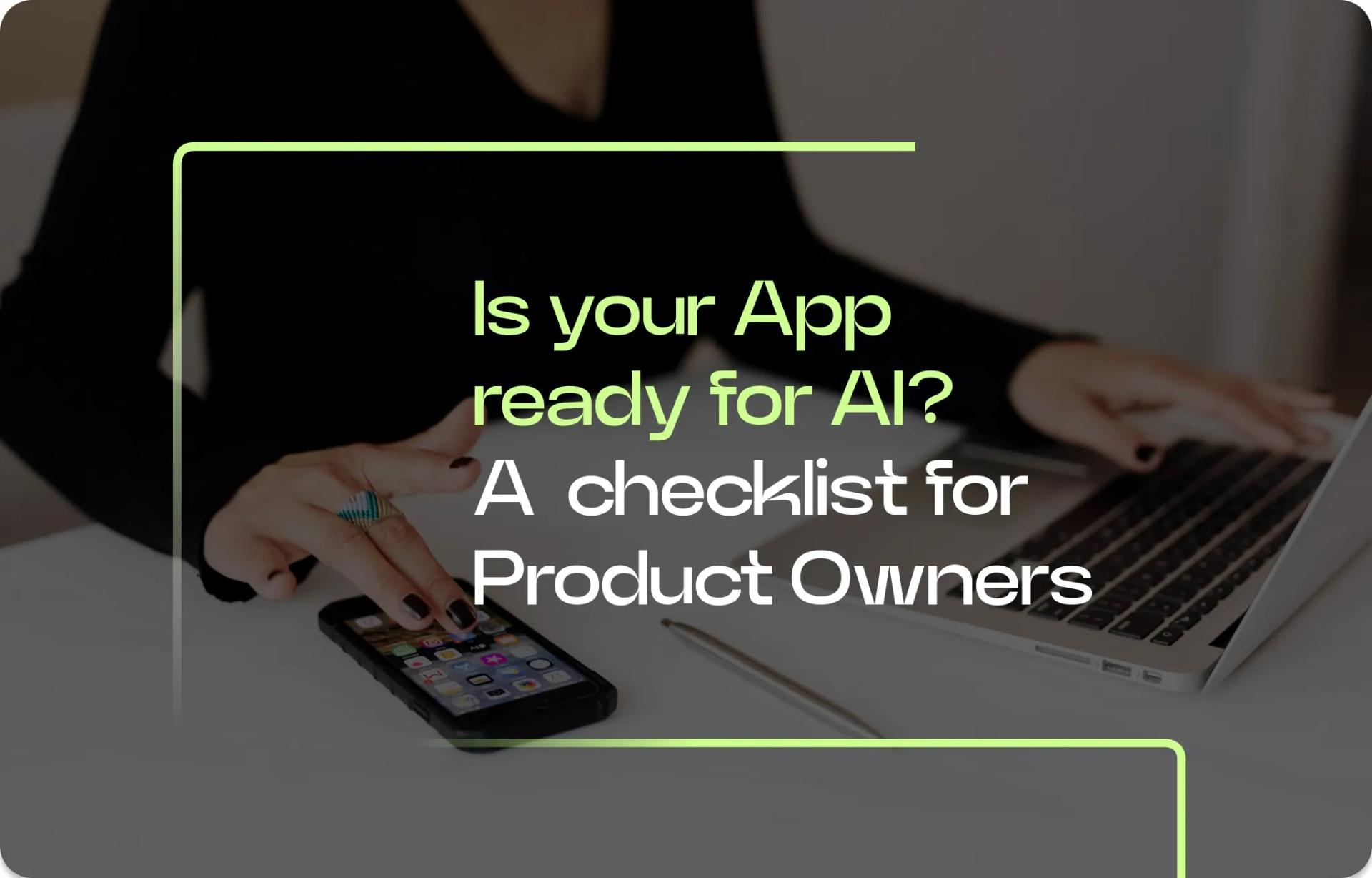Exaud Blog
Blog

Is your App Ready for AI? A checklist for Product Owners
This article provides a practical checklist to help product owners assess whether their app is truly ready for AI integration. From data quality to scalability and compliance, it outlines the key foundations needed to turn AI into a real, strategic advantage. Posted onby Exaud
Artificial Intelligence is evolving from an innovation advantage to an expectation in most digital products. Whether enhancing user experience, streamlining operations, or enabling smarter decision-making, AI has the potential to elevate most applications.
However, for product owners, the real question is not what AI can do but whether your application is actually ready to support it. Implementing AI requires more than ambition. It demands a clear strategy, reliable data infrastructure, technical scalability, and alignment across teams. Skipping these foundational steps can turn a promising AI initiative into a costly detour.
Therefore, use this checklist as a guide to assess where your application stands and make informed, strategic decisions about adopting AI in the right way.
1. Do you have clean, usable data?
AI is only as good as the data it learns from. Is your data complete and reliable? Are you collecting the right data to support your AI goals? (e.g. user behavior, purchase history, content patterns). If your answer is “not yet,” this is your first priority. Before investing in AI-based features, focus on improving your data pipelines and implementing strong data governance.
2. Is your App architecture scalable?
Many AI processes are resource-intensive. Running real-time recommendations, natural language processing, or computer vision models can put unexpected pressure on your infrastructure. Consider:
-Can your backend handle increased computational loads and API calls?
-Is your infrastructure cloud-based or containerized to support scaling as needed?
-Are you prepared to integrate third-party AI services or deploy models directly within your app?
Even if you’re starting small, building on scalable architecture ensures your app can grow with your ambitions and quickly adapt to future innovations.
3. Have you identified the right use case?
A successful integration begins with a clearly defined problem. Ask yourself:
-What business value will this feature bring?
-Can AI genuinely outperform a rule-based or manual solution in this case?
-How successful would this feature or initiative be?
Focusing on specific, measurable goals, like improving user retention or automating a manual workflow, keeps your efforts grounded.
4. Are you compliant with Data Privacy and Security Regulations?
AI introduces new layers of risk, especially when working with sensitive data. As a product owner, it’s your responsibility to ensure full compliance with relevant regulations such as GDPR, CCPA, or local laws. This includes securing user consent, being transparent about data usage, and ensuring model explainability in high-impact decisions like content moderation or loan approvals.
Collaborating with legal, compliance, and security experts early in your AI journey fosters user trust and ensures your AI solutions are not only innovative but also responsible.
5. Do you have the right internal expertise or partners?
AI implementation is multidisciplinary. You’ll need collaboration across engineering, data science, design, and operations.
-Do you have internal expertise in machine learning or AI product management?
-Are your engineering teams equipped to maintain and retrain models over time?
-If not, do you have a reliable technology partner with proven AI experience?
At Exaud, we support teams through every stage of AI integration, from identifying the right use case to designing scalable solutions. Whether you're exploring your first AI feature or enhancing an existing product, our team helps you move from concept to execution.
6. Is your App designed for continuous improvement?
AI isn’t a one-time deployment. To truly deliver value, your system must support ongoing learning and adaptation. This involves building mechanisms for collecting post-deployment feedback and maintaining processes to retrain and fine-tune models as new data becomes available. By integrating continuous improvement into your development cycle, you ensure your AI capabilities remain accurate, relevant, and competitive.
Final thoughts: AI as a strategic capability
Artificial Intelligence is more than a technological upgrade, it's a shift in how digital products are built, experienced, and evolved. But unlocking its true value isn’t about rushing to implement the latest model or chasing trends. It’s about aligning strategy with capability and building systems that are adaptable, ethical, and scalable.
By thoughtfully assessing your app’s readiness, from data quality and infrastructure to compliance and continuous learning, you’re not just preparing for AI. You’re positioning your product to lead. And, with the right preparation and partners, you can deliver technology that’s not only smart, but strategic.
Use this checklist to guide your internal discussions, align your team, and identify the next steps in your AI journey. Need support evaluating your app’s AI readiness? Let Exaud help you take the next step.
Related Posts
Subscribe for Authentic Insights & Updates
We're not here to fill your inbox with generic tech news. Our newsletter delivers genuine insights from our team, along with the latest company updates.